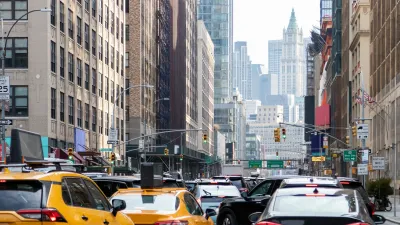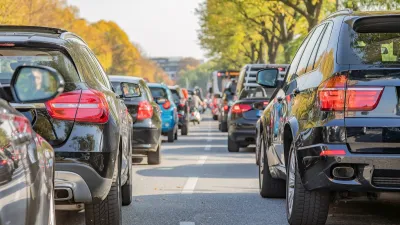No one wants to be stuck in traffic. But next time you find yourself pounding the steering wheel out of frustration just think about Eric Dumbaugh's findings regarding the connection between congestion and economic productivity.
Studies identifying the costs of congestion periodically make news headlines across the United States. "The common interpretation of such statistics," notes Dumbaugh, "is that our cities and regions would be so much more economically productive if only we could eliminate the congestion that occurs on urban streets." And the logic flowing from this argument has no doubt been used to support countless road building and widening projects across the country.
With the help of research assistant Wenhao Li, Dumbaugh sought to test the assertion that vehicle delay had a negative effect on urban economies. And what did he find? "As per capita delay went up, so did GDP per capita. Every 10 percent increase in traffic delay per person was associated with a 3.4 percent increase in per capita GDP."
"The relationship is almost certainly not causal. Instead, regional GDP and traffic congestion are tied to a common moderating variable - the presence of a vibrant, economically-productive city. And as city economies grow, so too does the demand for travel. People travel for work and meetings, for shopping and recreation. They produce and demand goods and services, which further increases travel demand. And when the streets become congested and driving inconvenient, people move to more accessible areas, rebuild at higher densities, travel shorter distances, and shift travel modes."
"None of this is to suggest that there is no benefit in having our transportation system operate efficiently. But automobile congestion, vehicle delay, and their proxy, level-of-service, are not measures of system efficiency. Nor are they measures of economic vitality. They are nothing more or less than measures of how convenient it is to drive an automobile."
FULL STORY: Rethinking the Economics of Traffic Congestion

Alabama: Trump Terminates Settlements for Black Communities Harmed By Raw Sewage
Trump deemed the landmark civil rights agreement “illegal DEI and environmental justice policy.”

Study: Maui’s Plan to Convert Vacation Rentals to Long-Term Housing Could Cause Nearly $1 Billion Economic Loss
The plan would reduce visitor accommodation by 25% resulting in 1,900 jobs lost.

Planetizen Federal Action Tracker
A weekly monitor of how Trump’s orders and actions are impacting planners and planning in America.

Wind Energy on the Rise Despite Federal Policy Reversal
The Trump administration is revoking federal support for renewable energy, but demand for new projects continues unabated.

Passengers Flock to Caltrain After Electrification
The new electric trains are running faster and more reliably, leading to strong ridership growth on the Bay Area rail system.

Texas Churches Rally Behind ‘Yes in God’s Back Yard’ Legislation
Religious leaders want the state to reduce zoning regulations to streamline leasing church-owned land to housing developers.
Urban Design for Planners 1: Software Tools
This six-course series explores essential urban design concepts using open source software and equips planners with the tools they need to participate fully in the urban design process.
Planning for Universal Design
Learn the tools for implementing Universal Design in planning regulations.
Caltrans
Smith Gee Studio
Institute for Housing and Urban Development Studies (IHS)
City of Grandview
Harvard GSD Executive Education
Toledo-Lucas County Plan Commissions
Salt Lake City
NYU Wagner Graduate School of Public Service




























